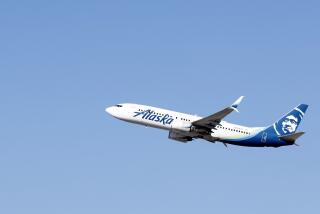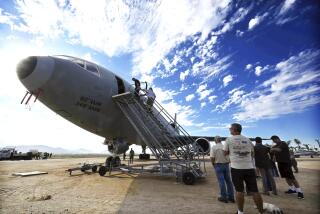FAA Surgeon Defends Letting Pilots With Health Trouble Fly
- Share via
WASHINGTON — The Federal Aviation Administration’s top medical officer defended his recertification of commercial pilots with medical problems Wednesday, but a congressional panel was told there is almost universal agreement among airlines that his decisions pose serious air safety problems.
Dr. Frank Austin Jr., the FAA’s air surgeon, blamed the controversy on a “difference of medical opinion” and said he is confident that his decisions on pilot medical appeals “present no safety risk.”
But in an appearance before a House subcommittee, Austin acknowledged that in 18 to 20 cases about which he had received complaints, 75% of the pilots later were barred from flying by their employer and several subsequently suffered heart attacks.
The physician, who became the FAA’s top medical officer two years ago, appeared before the House subcommittee on government activities and transportation with three of his strongest critics: the medical adviser to the Air Line Pilots Assn. and medical directors at two major airlines.
‘Very Serious’
“There is almost universal agreement that we have a very serious air safety problem” in the way the FAA under Austin has handled commercial pilots’ medical appeals, Robert Wick, chief medical officer at American Airlines, testified.
Wick said Austin has often overruled recommendations by a panel of cardiac specialists and accused the FAA physician of “failing . . . to appreciate the seriousness of many of these (medical) conditions.”
Dr. Gary Kohn, corporate medical director at United Airlines, testified that the FAA certification cases since Austin took over often have reflected “poor judgment” and “irrational decision making” that has allowed unfit pilots to be recertified for duty.
More to Read
Inside the business of entertainment
The Wide Shot brings you news, analysis and insights on everything from streaming wars to production — and what it all means for the future.
You may occasionally receive promotional content from the Los Angeles Times.










